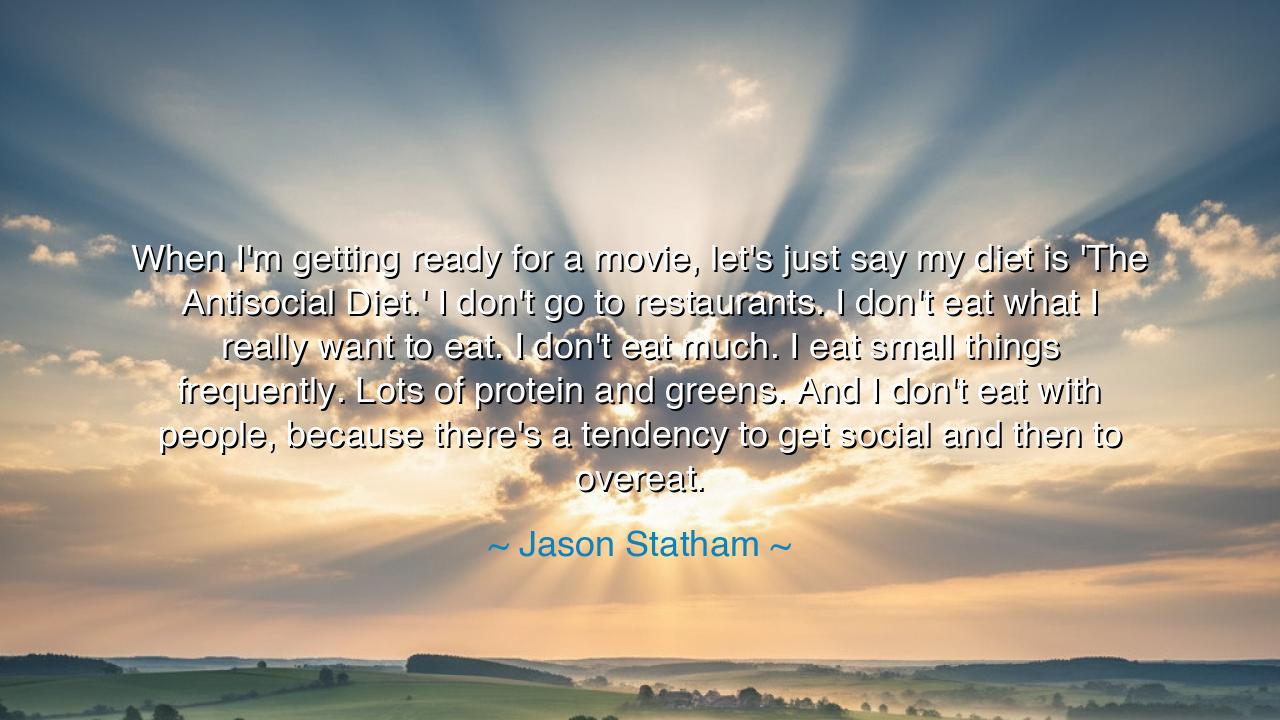
When I'm getting ready for a movie, let's just say my diet is
When I'm getting ready for a movie, let's just say my diet is 'The Antisocial Diet.' I don't go to restaurants. I don't eat what I really want to eat. I don't eat much. I eat small things frequently. Lots of protein and greens. And I don't eat with people, because there's a tendency to get social and then to overeat.






When Jason Statham spoke the words, “When I’m getting ready for a movie, let’s just say my diet is ‘The Antisocial Diet.’ I don’t go to restaurants. I don’t eat what I really want to eat. I don’t eat much. I eat small things frequently. Lots of protein and greens. And I don’t eat with people, because there’s a tendency to get social and then to overeat,” he was revealing more than a regimen of the body — he was unveiling a philosophy of discipline, solitude, and sacrifice. Beneath his simple confession lies an ancient truth: that greatness is not born in comfort or companionship, but in focus. For every man who seeks mastery must, at times, walk alone — withdrawing from the noise of pleasure to refine himself in silence.
The origin of this wisdom is found not in modern fitness, but in the ancient ways of warriors, monks, and philosophers. Statham’s “Antisocial Diet” is the modern echo of the ascetic’s vow — the choice to deny distraction for the sake of clarity. In ancient Greece, the athlete preparing for the Olympic Games would retreat from feasts and celebration, eating sparingly, training at dawn, living in quiet discipline. In the East, the samurai, before battle, would practice mindful restraint, eating only what would sustain agility and calm. For both warrior and artist alike, purity of focus is the seed of mastery. Statham’s solitary meals, his small portions and simple foods, are not punishment, but a ritual of devotion to purpose — the sharpening of body and will alike.
The Antisocial Diet represents not just restriction of food, but separation from temptation — from the human tendency to lose vigilance amid comfort. “I don’t eat with people,” he says, “because there’s a tendency to get social and then to overeat.” Here we see the deeper teaching: that even companionship, noble as it is, can become a trap when the goal requires total concentration. The ancients called this enkrateia — self-mastery. It is not hatred of pleasure, but command over it. The man who can turn away from delight, even for a season, proves that his purpose governs his appetite. In this lies true strength — not in muscles or motion, but in the quiet sovereignty of self.
There is a story of Leonidas of Sparta, who before leading his three hundred men to Thermopylae, refused the rich meals offered to kings. He ate barley bread and olives, saying, “The stomach must learn to obey the mind before the soldier can command the field.” Like Statham, Leonidas knew that indulgence breeds weakness. To deny oneself is not to suffer, but to prepare. The body trained in hunger, the spirit tempered in solitude, becomes a vessel of precision. When Statham withdraws from restaurants and gatherings, he does not reject the world — he refines himself to serve it better when the time comes.
His diet of protein and greens, eaten in small amounts, reflects the timeless principle of balance. Too little weakens; too much dulls the edge. The ancients believed that food carried not only matter but energy — that what one ate shaped not only strength but spirit. The Greens of the earth give calm and endurance; protein, drawn from life, grants vigor and resilience. By keeping his portions small and his choices clean, Statham honors the rhythm of the natural body — consuming not for pleasure, but for purpose. In this way, eating becomes not indulgence, but meditation — a daily act of self-respect.
Yet there is also a shadow to this discipline — a solitude that must be borne with dignity. The path of mastery often demands distance. To eat alone, to resist the laughter of companions, to sit in stillness while others feast — these are the trials that forge the warrior’s patience. It is no accident that saints, artists, and soldiers alike have embraced loneliness as the price of creation. For when a person stands apart, they begin to hear a quieter voice — the whisper of will, the hum of destiny. In denying company at the table, Statham dines instead with focus, intention, and resolve.
The lesson of this quote, then, is not merely about diet, but about devotion. Whatever one seeks — strength, art, wisdom, or peace — it demands a season of sacrifice. There comes a time when the world’s chatter must fade, when comfort must give way to discipline, when the heart must choose purpose over pleasure. Yet take heart — this sacrifice is not permanent. The ancients taught that once the battle is won, the warrior returns to the feast; the monk, having fasted, rejoices in fullness once again. Moderation restores balance, but only after mastery has been proven.
So, children of ambition, heed the wisdom in Statham’s words: when the moment of preparation arrives, withdraw. Guard your habits. Eat with awareness. Work in silence. Let solitude be your ally and focus your nourishment. For in the stillness of restraint, the body grows strong and the spirit sharpens like a blade. And when the time comes to step back into the light — when the movie begins, when the goal is reached — you will emerge not only prepared, but transformed, a living testament to the eternal law of mastery: that greatness is born not in comfort, but in control.






AAdministratorAdministrator
Welcome, honored guests. Please leave a comment, we will respond soon